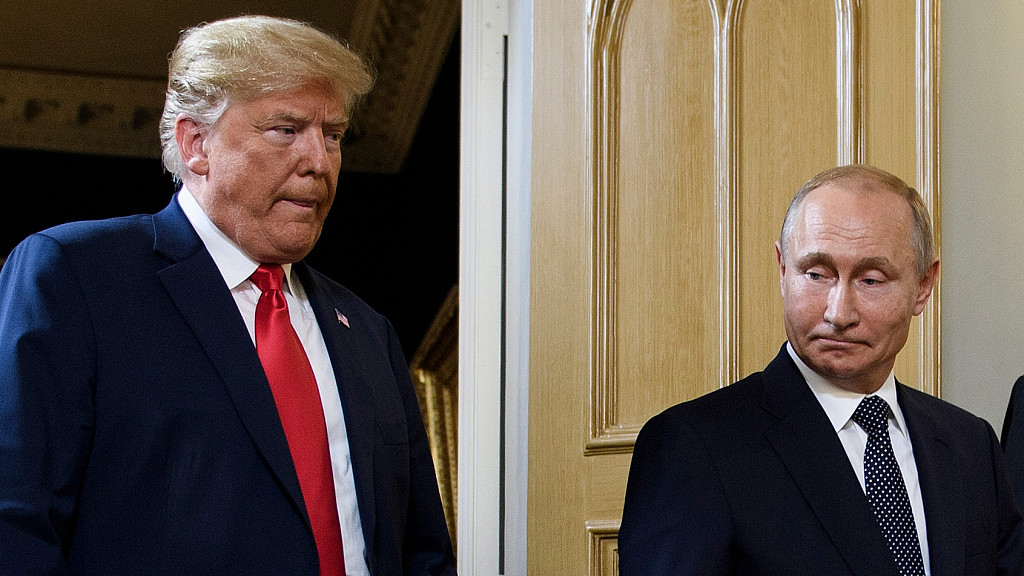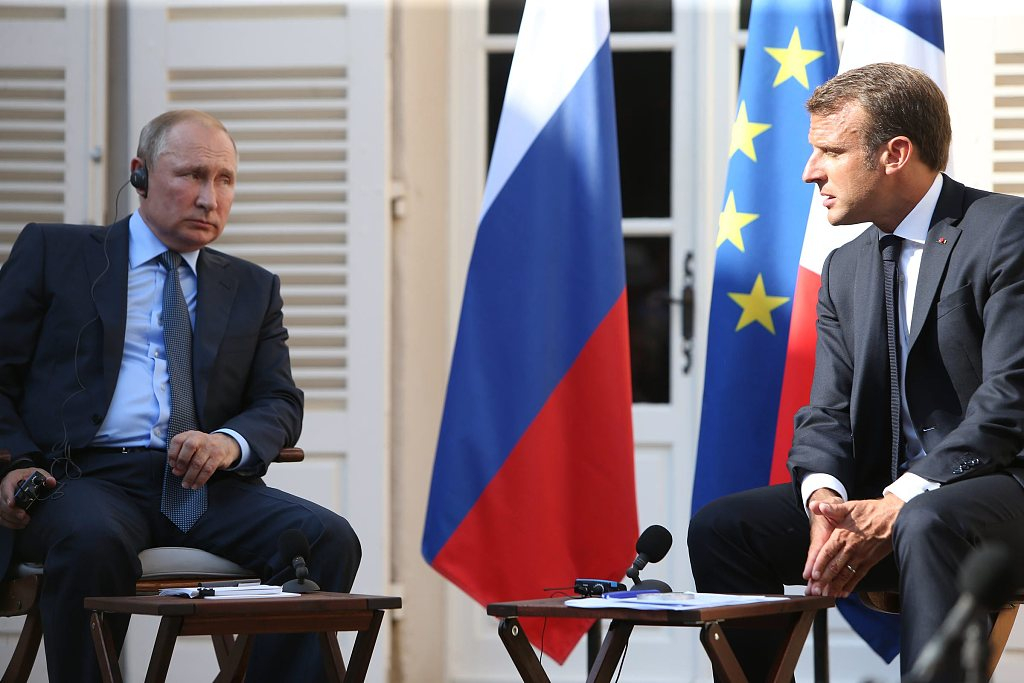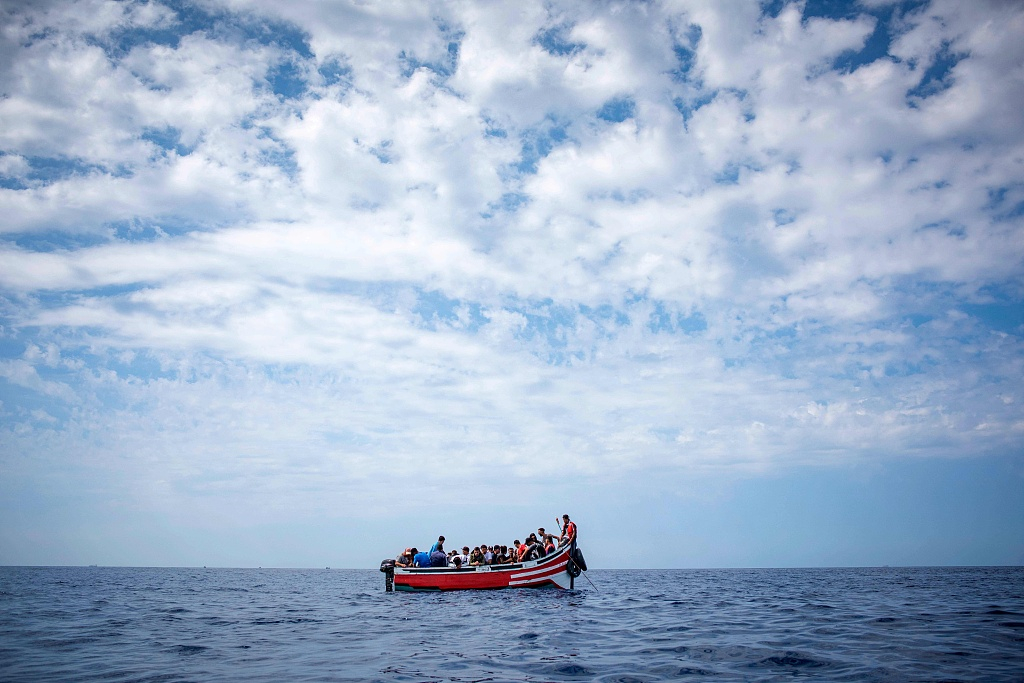

Editor's note: Zhao Yuanzhen is an opinion editor with CGTN Digital. The article reflects the author's opinions, and not necessarily the views of CGTN.
A five-year period can witness many strategic changes for world politics, including a re-acceptance of Russia by European and American leaders. In 2014, after the Crimea crisis, the EU and U.S. quickly slapped sanctions on Russia and pushed Moscow out of the then G8 club. The following years have seen ties between Russia and Western countries go down the hill.
But French President Emmanuel Macron seems to be willing to offer Russia an olive branch as he invited Russia to the G7 table, only days before the Biarritz summit in France. "Russia is a very deeply European country," said Macron, signaling his want that Moscow be involved in European issues. U.S. President Donald Trump quickly joined Macron’s calls and renewed his appeal to "have Russia in and it should be G8."
But only a year ago European leaders were saying that Russia is a "problem" that needs to be solved, rather than an important player in international issues like the Syrian crisis. Could we be seeing the beginning of thawing relations between Russia and Western powers?

French President Emmanuel Macron (R) meets with Russia's President Vladimir Putin at his summer retreat of the Bregancon fortress, southern France, August 19, 2019. /VCG Photo
At this point, it seems that the offer by France and the U.S. is more likely based on the two countries' own agendas. For the French president, who's always tried to promote multilateralism, bringing back Russia to the table is a strategic move to balance against Trump's "America First" principle, which has already put the transatlantic alliance through a hard time. With Britain trapped in the Brexit mire and Germany's Angela Merkel stepping down, Macron has expressed his hope to "revive" Europe on different occasions and apparently showed his ambition to "lead" Europe.
That is also why when Trump was first elected and European leaders were still confused on how to deal with a U.S. president who does not respect European values, Macron made the first move to try and make friends with Trump. But their "bromance" could hardly hide their discord over the Paris Accord and Iran's nuclear crisis. It seems that Macron has finally realized that he cannot persuade Trump to turn back to a multilateral table.
Meanwhile, the unstable situation in the Middle East has also made coordination with Russia even more important. Russia could be a mediator in persuading Iran not to escalate tensions and an influencer in the Syrian issue to help with the refugee crisis in Europe. On the issue of Iran and climate change, France and Russia are in the same camp against the U.S.

A boat carrying migrants is stranded in the Strait of Gibraltar before being rescued by the Spanish Guardia Civil and the Salvamento Maritimo sea search and rescue agency, September 8, 2018. /VCG Photo
As for Trump, this is not the first time that he proposed to let Russia back to the table. Other than his personal admiration, Trump's willingness to reconcile with Russia seems to be driven by his plan to contain China. His tariffs have seriously worsened bilateral ties between China and the U.S. and effectively sped up closer cooperation between China and Russia.
The U.S. sees a rising China and militarily strong Russia as the primary challenges to maintaining its global hegemony. If the previous U.S. leaders had to think twice about going against China given the two countries' close economic ties, Trump was not afraid of waging a trade war as his voters are people who have blamed globalization, especially China, for their economic loss. So to keep pressuring both China and Russia would be a much costly solution and for now, the priority is China.
But the road for Russia to normalize relations with Western countries is bound to be bumpy as both Trump and Macron are facing backlash domestically. For America, being anti-Russia is a politically correct move and has to be maintained. Otherwise, the U.S. media would not be so angry as to accuse Trump of committing "treason" after the Helsinki summit. It also needs the Russia-as-threat narrative to maintain the transatlantic alliance within NATO. The U.S. position on Ukraine is also unlikely to change, which is yet another hurdle between America and Russia. For Macron, he still has to persuade other European countries to change their long-held hostility against Russia.
More importantly, both the U.S. and the EU have extended the sanctions against Russia which makes their offer even more insincere. Putin himself also showed more interest in other regional initiatives like the Shanghai Cooperation Organization. In short, it would take much more than a G8 membership to win Putin's trust.
(If you want to contribute and have specific expertise, please contact us at opinions@cgtn.com)

Copyright © 2018 CGTN. Beijing ICP prepared NO.16065310-3
Copyright © 2018 CGTN. Beijing ICP prepared NO.16065310-3